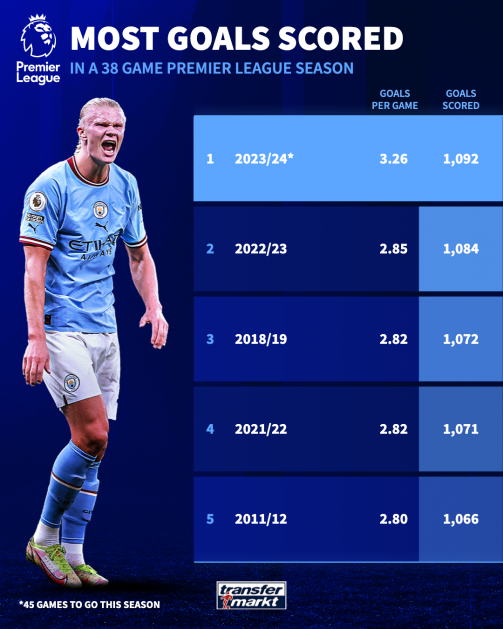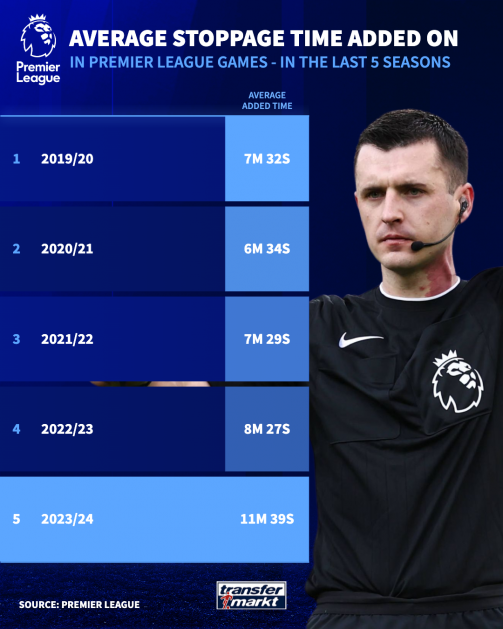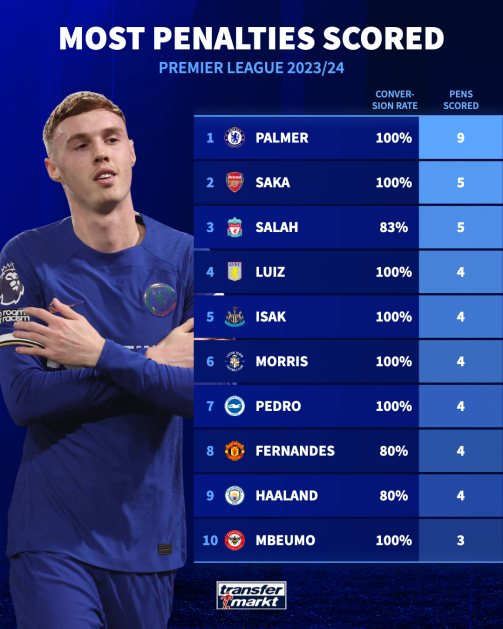Already 1,092 goals

©TM/IMAGO
Given how tactical and detailed football has become, and given the measures managers go to make sure their teams are set up perfectly defensively, studying distances between each player etc, it’s perhaps surprising what we have witnessed this season. It’s been a goal-fest. With still 45 games of Premier League football to be played, the 2023/24 season has already become the season with the most ever goals in a single 38 games campaign. The 1,092 goals has surpassed last term’s 1,084, which had previously set the record around a year ago. Pure entertainment.
With a three-horse Premier League title race, a tight battle for fourth spot, and a relegation battle with plenty of twists and turns, you just cannot take your eyes off of the English top-flight this season. Harry Maguire’s equaliser for Manchester United against Sheffield United at Old Trafford on Wednesday night was the goal that officially made this season a record breaker. When trying to mitigate the reason behind the astronomical amount of goals on show in the Premier League this season, there could be a number of reasons.

Why have there been so many Premier League goals this season?
At the current goal scoring rate of 3.26 goals per game, there will be 1,239 goals by the end of the season, breaking the previous record by a substantial 155 goals. When trying to assess the cause for this influx of goals, we should perhaps start with the amendments to the rules around stoppage time. New laws from this season have determined that referees would dramatically increase the amount of added time in both halves in an attempt to combat time wasting i the English top-flight.

It has made a massive difference. As can be identified above, this season there have been on average 11 minutes and 39 seconds of stoppage time for each game across the season. Last campaign, the average was just 8 minutes and 27 seconds – and even that was a record for the last ten seasons. It doesn’t take a mathematician to conclude that the game going on longer is going to lead to more opportunities for goals to be scored, and it has surely been a huge factor in this season’s high goal tally.
That brings us on to VAR – also one of the reasons that has led to more stoppage time. There have been 93 penalties awarded in the Premier League this season (6 less than the whole of last season – 99). Whilst there has only been a slight increase in the amount of penalties per game this season (0.28) to last season (0.26) the conversion rate of these spot kicks has dramatically increased. Teams seem to be putting more time into making sure they have a penalty taker ready for the big occasion, and 90.3% of penalties have been converted this season, compared to just 74.7% last campaign.

It should also be noted that a tactical shift may have had a big sway into the number of goals we have seen. Teams such as Tottenham under Ange Postecoglou are committed to playing only one way – on the front foot, pressing aggressively with a high line. More sides seem to be proactive in trying to score goals, whether that be through possession domination or through fast transitions. Another factor is how poor some of the teams at the bottom of the table have been. Sheffield United have conceded a record 92 goals, and are on course to become the first ever team to concede 100 goals in a single Premier League season. The other two promoted teams in Luton and Burnley have also conceded 144 goals between them this season. Goals going in at an unprecedented rate – long may it continue.

